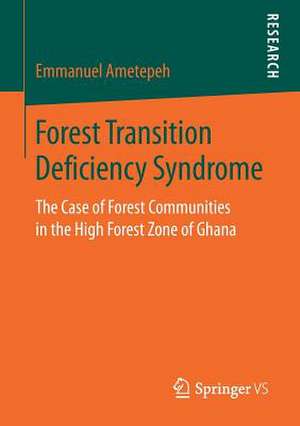Forest Transition Deficiency Syndrome: The Case of Forest Communities in the High Forest Zone of Ghana
Autor Emmanuel Ametepehen Limba Engleză Paperback – 18 ian 2019
While previous studies focus on lack of enforcement of forest laws, poverty, and ecological values of forest dependent people, coherent studies on people’s motivations for forest illegalities and non-compliance behavior remain scanty. Emmanuel Ametepeh argues that the systematic analysis of cause-and-effect patterns related to forest management measures and policies through the lenses of the Forest Transition Theory uncovers severe limitations. The resulting multi-complex stress factors adversely impact and hence manifest in the form of deviant compliance behavior (“syndrome”) in the management endeavor of forest-fringe people. The Author shows that motivations for forest illegalities and associated non-compliance behavior is largely an outcome of adverse experiences forest people have been subjected to as a result of historical and contemporary neglects and marginalization in the management endeavor.
Preț: 389.31 lei
Nou
Puncte Express: 584
Preț estimativ în valută:
74.49€ • 77.78$ • 61.65£
74.49€ • 77.78$ • 61.65£
Carte tipărită la comandă
Livrare economică 04-18 aprilie
Preluare comenzi: 021 569.72.76
Specificații
ISBN-13: 9783658250386
ISBN-10: 3658250380
Pagini: 352
Ilustrații: XV, 356 p. 1 illus.
Dimensiuni: 148 x 210 mm
Greutate: 0.45 kg
Ediția:1st ed. 2019
Editura: Springer Fachmedien Wiesbaden
Colecția Springer VS
Locul publicării:Wiesbaden, Germany
ISBN-10: 3658250380
Pagini: 352
Ilustrații: XV, 356 p. 1 illus.
Dimensiuni: 148 x 210 mm
Greutate: 0.45 kg
Ediția:1st ed. 2019
Editura: Springer Fachmedien Wiesbaden
Colecția Springer VS
Locul publicării:Wiesbaden, Germany
Cuprins
Forest Transition Theory and Pathway Policies.- Globalization Pathway Policies and Institutional Framework.- Domestic Pathway Policies and Institutional Framework.- From Deficiencies to Syndrome: A Case Study of Policies in Practice.- Hybrid Pathways for Ghana – Recommendations.
Notă biografică
Emmanuel Ametepeh received his doctoral degree under the supervision of Prof. Dr. Regina Kreide at the Faculty of Social and Cultural Studies at the University of Giessen, Germany.
Textul de pe ultima copertă
While previous studies focus on lack of enforcement of forest laws, poverty, and ecological values of forest dependent people, coherent studies on people’s motivations for forest illegalities and non-compliance behavior remain scanty. Emmanuel Ametepeh argues that the systematic analysis of cause-and-effect patterns related to forest management measures and policies through the lenses of the Forest Transition Theory uncovers severe limitations. The resulting multi-complex stress factors adversely impact and hence manifest in the form of deviant compliance behavior (“syndrome”) in the management endeavor of forest-fringe people. The Author shows that motivations for forest illegalities and associated non-compliance behavior is largely an outcome of adverse experiences forest people have been subjected to as a result of historical and contemporary neglects and marginalization in the management endeavor.
Contents
- Forest Transition Theory and Pathway Policies
- Globalization Pathway Policies and Institutional Framework
- Domestic Pathway Policies and Institutional Framework
- From Deficiencies to Syndrome: A Case Study of Policies in Practice
- Hybrid Pathways for Ghana – Recommendations
Target Groups
- Academics and scholars, students of environmental studies and politics
- Climate change policy makers, forest management practitioners, development policy makers, human rights activists, activists in civil society organizations, e.g. environmental NGOs
The Author
Emmanuel Ametepeh received his doctoral degree under the supervision of Prof. Dr. Regina Kreide at the Faculty of Social and Cultural Studies at the University of Giessen, Germany.
Caracteristici
Publication in the field of climate change policy and forest management
